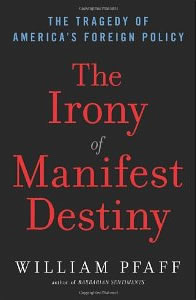Book Notes
 William Pfaff, The Irony of Manifest Destiny; The Tragedy of America's Foreign Policy (New York: Walker and Company, 2010), 222pp.
William Pfaff, The Irony of Manifest Destiny; The Tragedy of America's Foreign Policy (New York: Walker and Company, 2010), 222pp.
For sixty years William Pfaff (b. 1928) has distinguished himself as a trenchant analyst of foreign policy and international relations, most notably on the pages of the International Herald Tribune, the New Yorker, and the New York Review of Books, not to mention in nine books. With the encyclopedic knowledge of history that has characterized his previous works, this sweeping essay incorporates everyone from Hannah Arendt and Napoleon to Thucydides and Faust. Pfaff laments the "extreme ideological violence" and "secular utopian aspirations" that, however well intentioned, have exploited millions in the name of liberation.
According to Pfaff, the "New Paganism" of the secular Enlightenment dispensed with religion and adopted its own myth of progress, resulting in a "powerful universalizing utopian ambition" that almost always results in "exterminating violence." Whereas religious worldviews reserved redemption for the afterlife beyond history, secular utopias demand transformation here and now. Although American ambitions were at first tempered by its isolationist posture in relation to Europe, beginning with the end of World War I and Woodrow Wilson, it began to see itself as the single "savior nation" of the world responsible for unapologetic intervention. "It is America's job to change the world," said Condoleezza Rice, "and in its own image." This utopian ideology, combined with pragmatic economic interests like natural gas and oil, has led to a condition of permanent war. America's national myth of utopian democracy, says Pfaff, "surpasses historical possibility," but is nevertheless on full display in more than 1,000 military bases overseas.
Pfaff argues that there's an "irreconcilable contradiction" between historical reality and America's mythology as savior of the world. This has become most evident in the disastrous interventions in Iraq, Afghanistan, and Pakistan, which Pfaff describes as "not ignoble, but simply breathtakingly ignorant, impractical, indifferent to historical experience and the political limits of nations, and contrary to the will as well as the interests of the peoples involved." In his final pages he laments the loss of political realism as seen in George Kennan and Reinhold Niebuhr. A more non-interventionist posture would admit that "western democracy cannot prevail internationally," but nonetheless not remain "passive in the face of atrocity." Unless and until that happens, we're left with the "Faustian spirit of extreme and defiant ambition and extreme risk."


